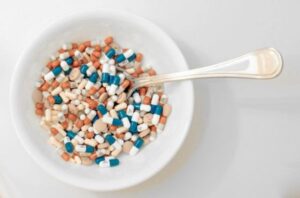May Cause Outrage: The 9 Biggest Big Pharma Fines Ever

Think pharmaceutical companies have your best interest at heart? Then why have they been repeatedly fined billions of dollars for fraud?
Any television commercial or ad that suggests you ask your physician if the nondescript product alluded to is “right for you” is suspect to begin with. It’s perhaps no surprise, then, that pharmaceutical companies are repeatedly the biggest fraud offenders in our country. (Take five, Wall Street.)
Last month, the Department of Justice ordered GlaxoSmithKline to pay a $3 billion fine for fraud, marking the largest fine of its kind in our country’s history (not just in the pharmaceutical industry). And while it may be the biggest, it’s certainly not the first, and probably not the last, either.
At a time when Americans are consuming more prescription drugs than ever before (more than $300 billion worth annually) and often in combinations that have not been tested for safety, pharmaceutical companies are repeatedly charged for illegal promotion of their patented prescription drugs, primarily to treat conditions for which they’re not approved. In some cases, they’ve never even been tested on the conditions for which sales teams are promoting them.
In GlaxoSmithKline’s case, the company pleaded guilty to the charges, which included the unlawful promotion of certain drugs (Paxil and Wellbutrin), failure to report safety information, and false price reporting. In a statement on the Department of Justice’s website about the case, James M. Cole, Deputy Attorney General said, “At every level, we are determined to stop practices that jeopardize patients’ health, harm taxpayers, and violate the public trust—and this historic action is a clear warning to any company that chooses to break the law.”
If pharmaceutical companies would go to these lengths to sell more drugs, how trustworthy can the products be in the first place? Could these fraudulent practices be the wake up call that leads to an exodus away from “treating” symptoms with prescription drugs that may or may not be effective and usher in a return to holistic healing treatments and prevention methods?
After you read about these biggest fines in Big Pharma’s history, you may just find yourself ready to kick the capsules to the curb and dive into natural healing alternatives to pharamceuticals.
1. GlaxoSmithKline (2012): Illegal promotion of drugs (see above). The fine: $3 billion (largest fraud fine ever).
2. Pfizer (2009): Off-label promotion of COX-2 drugs including Bextra, Geodon, Lyrica and Zyvox, with “the intent to defraud or mislead” cost the pharma giant a loss of 90 percent of its 2008 income. The fine: $2.3 billion (then the largest fine of its kind).
3. Eli Lilly (2009): The maker of Zyprexa has had several court appearances over the anti-psychotic drug, which Lilly attempted to bait elderly populations suffering from dementia to give a whirl. The sales team was directed to disregard the law. Several lawsuits in various states resulted. The fines: $1.4 billion, $25 million, and $22.5 million (reduced from $2 billion for violating use of a product label approved by the FDA).
4. Abbott (2012): Abbott had no science to back up its target of the drug Depakote—an anticonvulsant—for use in treating elderly populations suffering from aggression and agitation related to dementia. But that did not stop the company from sending its sales reps into nursing homes. The company was also fined for promoting it as a treatment for schizophrenia although no scientific evidence existed to support that claim. The fine: $1.5 billion.
5. Merck (2011): The painkiller Vioxx was eventually pulled from the market in 2004 for its connection with an increased risk of heart attacks. But before then, Merck illegally promoted it as a treatment for rheumatoid arthritis despite any official approval. The company also reportedly made misleading statements about Vioxx’s effect on heart health. The fine: $950 million.
6. Allergan (2010): Botox—the cosmetic toxin injected into the face to smooth out wrinkles and plump up lips—was misbranded by Allergan as a treatment for pain, headaches and cerebral palsy. The ruling also found that the company paid doctors $1,500 to attend presentations on the drug’s other uses in order to help the company push out its product. The fine: $600 million.
7. AstraZeneca(2010): After misleading doctors and patients over the safety of its antipsychotic drug, Seroquel, which included known risks of gaining weight and developing diabetes. The company continued to deny any wrongdoing. The fine: $520 million.
8. Novartis(2010): Between 2000 and 2001, Novartis used misbranded promotion of the drug Trileptal for treatment of neuropathic pain and bipolar disorder despite no approval for treating those conditions. Other Novartis drugs were also misbranded, including Diovan, Exforge, Tekturna, Zelnorm and Sandostatin. The fine: $422.5 million.
9. GlaxoSmithKline(2009): Between 1997 and 2004, the company was investigated for off-label promotion of Wellbutrin SR, an anti-depressant that had been illegally prescribed for cases of bipolar disorder as a result of the company’s marketing efforts. The fine: $400 million.
Keep in touch with Jill on Twitter @jillettinger
Sources:
http://www.justice.gov/opa/pr/2012/July/12-civ-842.html
http://www.fiercepharma.com/special-reports/big-pharma-behaving-badly-timeline-settlements
http://www.propublica.org/special/big-pharmas-big-fines
Image: Carsten Schertzer

